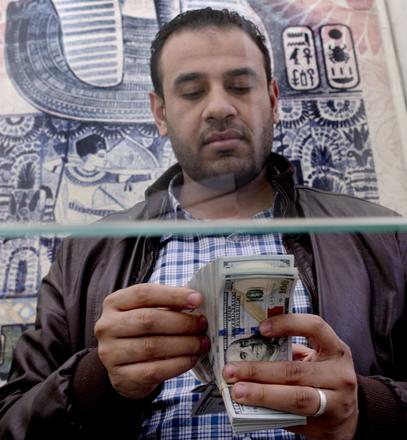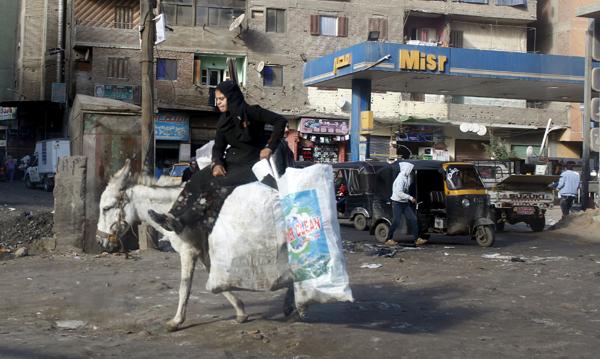You are here
Egypt devalues pound
By Agencies - Mar 14,2016 - Last updated at Mar 14,2016

A man counts US dollars at an exchange office in Cairo, on Monday (AP photo)
CAIRO — Egypt's central bank said on Monday it had devalued the Egyptian pound by 14.3 per cent to 8.95 to the US dollar to face "challenges" emerging from declining foreign currency inflows.
The bank has been battling an acute US dollar shortage over the past few months, with the local currency often trading at a rate of almost 10 pounds to a dollar on the black market.
The devaluation boosted sentiment on the stock market, with Egypt's benchmark EGX30 index rising 6.7 per cent to 7,003.91 in midday trading.
The Central Bank of Egypt said the move to devalue the pound was aimed at adopting a "more flexible foreign exchange policy" that would be driven by demand and supply.
"This will resolve the exchange rate irregularities, resulting in a more regular and continuous flow of foreign currency," it added in a statement.
The move would also help face "challenges from a noticeable decline in foreign currency inflows from tourism, direct investment and remittances from Egyptians living overseas".
Tourism, a cornerstone of the Egyptian economy and a key foreign exchange earner, has been severely hit by years of political turmoil triggered since the fall of longtime leader Hosni Mubarak in 2011.
It was dealt a body blow with the bombing of a Russian passenger airliner over the Sinai Peninsula on October 31 that killed all 224 people on board, mostly Russian tourists.
Revenues from tourism slumped 15 per cent year-on-year to $6.1 billion in 2015.
Egypt's foreign exchange reserves have fallen from more than $36 billion in 2010 to about $16 billion, despite some $20 billion given in aid to Cairo by its powerful Gulf allies.
But the bank said, the reserves would reach $25 billion by the end of 2016 on the back of "foreign investments and an increase in the competitiveness of the Egyptian economy".
Separately, Egypt's tourism minister said in an interview last week that Cairo plans to announce incentives for low-cost airlines such as easyJet and Germany's Air Berlin and Condor to help combat a slide in tourist arrivals.
"We already have a programme for tour operators that have flights, but we never had a programme for airlines alone," Hisham Zaazou told Reuters on the sidelines of the ITB travel fair.
Visitors to Egypt's beaches and ancient sites bring in business which accounts for 11.5 per cent of the country's economy.
The government has been offering tour operators an incentive of $30 per seat on aircraft on which between 60 and 90 per cent of seats have been filled.
Zaazou said it was not yet clear whether the new programme for commercial airlines would pay a certain amount per seat on planes or whether it could offer alternate incentives such as lower handling fees at airports.
"I will announce that [programme] very soon when I meet with everybody and listen to everybody," he said in the interview.
The number of tourists coming to Egypt fell around 6 per cent to 9.3 million in 2015 from a year earlier due to a drop following the plane crash in October, while receipts slid to $6.1 billion from $7.2 billion, he indicated.
That is a far cry from around $12.5 billion in annual receipts Egypt earned before the 2011 uprising which scared away tourists and foreign investors.
Zaazou said arrivals in the first couple of months of 2016 were down 30 to 40 per cent compared with a year earlier and said he did not expect to see a significant improvement before the second half of the year.
"If we can stabilise the [2016] number around where we were last year, around 9 million, I will be happy. We can then enter 2017 on better grounds and make up for lost time," he added.
Related Articles
CAIRO — Egypt plans to build 1 million homes for poorer people at a cost of almost $20 billion over the next five years, the housing ministe
Egypt's tourism minister on Sunday announced ambitious plans to try to revive the country's tourism sector, in distress after years of political turbulence.
CAIRO — Egypt's pound plunged in value on Thursday as the central bank floated the currency to address a dollar crunch that threatened to ca

















